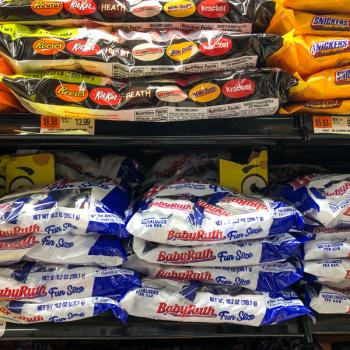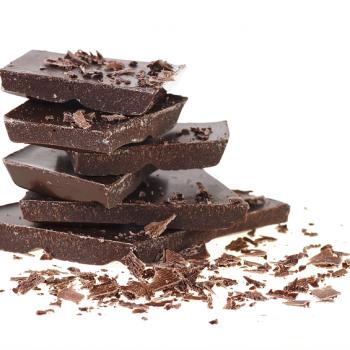Over Christmas, I saw, Philomena, a well-done movie of evil masquerading as good, the need for closure, the temptation for revenge, and the freedom of forgiveness. Major human life themes combined with great acting: compelling and captivating.
The story revolves around an Irish woman trying to find her son, adopted nearly 50 years before. When she learns that he had been adopted by US citizens and grown up here, her immediate concern: “What if he is obese? The portions are so huge there.”
That line about the huge portions brought a good audience laugh. But perhaps an uncomfortable laugh–these words hit our culture of excess. Yes, the portions are huge here.
Most human history has been lived in a world of food scarcity. People learned to eat when food was available–and to eat abundantly during times of food generosity. The next meal remained a mystery and a constant struggle. Humans were lean by necessity. To be called,“very thin” was NOT a compliment–it meant not enough food to go around, infertility, and early death.
So eating everything in front of us has been a survival technique for millions of years. Just because food is suddenly (evolutionarily speaking) abundant doesn’t mean our bodies understand that. Our bodies remain in survival mode–with no assurance that there will be food tomorrow or even five or six hours from now.
So, huge portions, when presented, are consumed. This doesn’t make us bad, or without self-control, or greedy or gluttons. It’s just bred into us, and will take a long time for such a genetic need to disappear.
Because I have been privileged to travel overseas, occasionally for extended periods of time, I have seen us upon my return as do many who land in the US for the first time: shocked at how big a people we are. I nearly always lose weight when I travel, because I eat in the same way as do the people I am visiting. For me, that has meant smaller portions, fresher food, and generally a lot of walking. (Obviously, I am not talking about cruise ship traveling, which I understand is set up for 24 hour/day feasting.)
A number of years ago, I spent a week teaching in a mission school in Kazakhstan. I ate lunch daily with the students–an unvarying routine of borscht, essentially tomato based vegetable soup, supplemented by piles of bread just to help stay warm in that underheated building and to give strength for the periodic descent to the deep basement (and completely unheated) toilets (I’m not even going to try to describe them except that to say when I next saw a Western toilet again, I nearly wept with relief.)
I had packed some food and picked up a cheese during a layover in Amsterdam. Darn good thing or I would have nearly starved that week–grocery stores were essentially empty and what food was available came from an open market, well populated by flies landing on freshly slaughtered sheep. The only things in abundance were cigarettes and vodka. Didn’t take me long to figure out why. And yes, I lost weight that week–because I was also staying on the seventh floor of an apartment building without elevators.
And I saw not one typical US sized body the whole time I was there.
Now the Holy Scriptures tell us that our bodies are important–that our physical selves become the vessel in which the Presence of God resides. Our hands and feet and brains and bodies are called upon to relieve suffering and fight oppression and stand firm against evil forces. Our ability to live out the calling to do and be good in the world can and often is greatly hampered by the devastation that those “huge portions” bring us. They drag us down, impose on us the diseases of civilization, shorten our breaths and fatten our hearts.
As I write this, I am at a restaurant with a “huge portion” of salad in front of me. I am half-way finished with it, and aware that I am not in the least hungry now, just eating because it is there, because, God-forbid, if I don’t eat it, I will “waste” it. But if I do eat it then I will “waist” it, indeed.
I’m not calling for people, or me, to go on “diets.” They don’t work. I am just suggesting that perhaps we need to be more aware that our bodies are not meant for modern eating patterns of giant portions. Hunger is something almost none of us really know. I’ve noticed recently that many youth need to constantly have food of some sort in front of them. This is a dangerous pattern–learning to distinguish between real hunger when food becomes a necessity to keep going and our modern appetites is a skill worth developing.
The best way I know to do this is to return to the discipline of the periodic fast. For those who are used to consuming all day long, a “fast” may be as little as going four hours or longer between any consumption. See what happens when hunger itself actually shows up, rather than appetite. Then, when food is served, wait about five minutes before actually consuming. Use those minutes to give heartfelt thanks for provision–and pray for those who have not been given that privilege. Pray for those who are “too thin” by means of real deprivation, not because it is a fashion statement.
Perhaps 2014 could be a year when we could return to the appreciation of food, rather than the over-consumption of it. Perhaps it could be a year where we see each bite as a privilege, and one to be savored, rather than mindlessly consumed while watching TV or driving or playing with an electronic device.
Perhaps a year to say, “Give us this day our daily bread” and really mean it. Just for this day, please, enough to eat. And if I have too much, give it to others so they have their daily bread as well.












